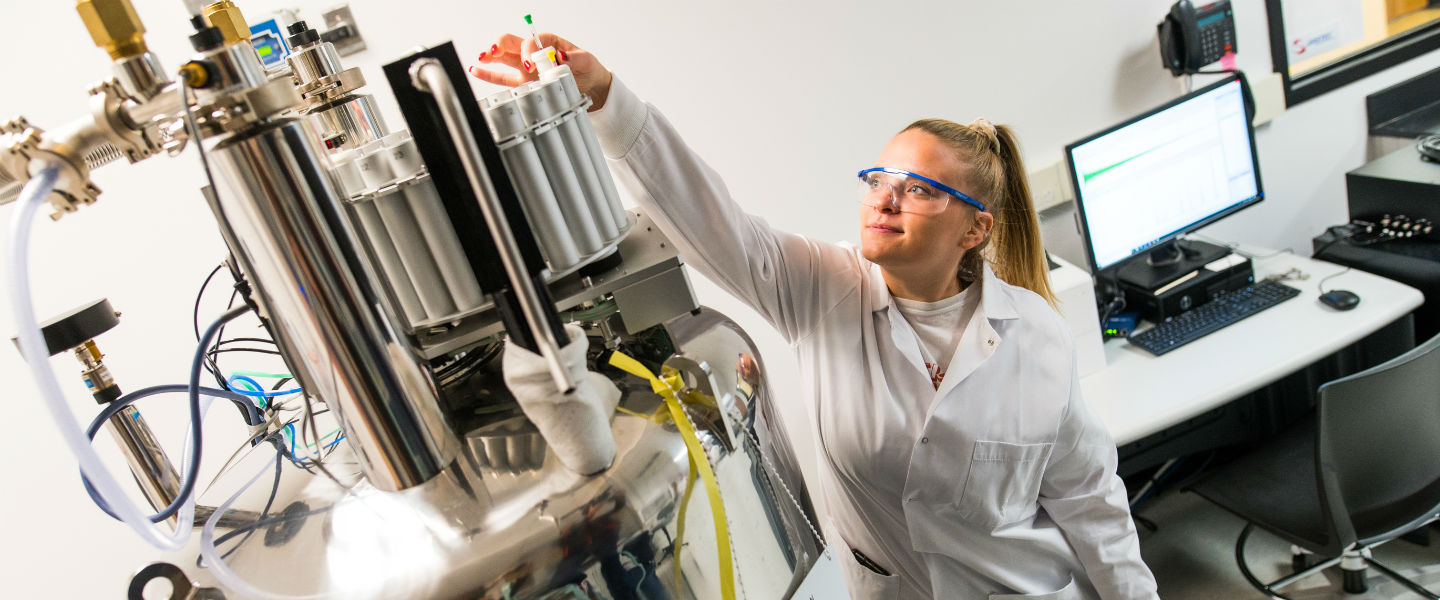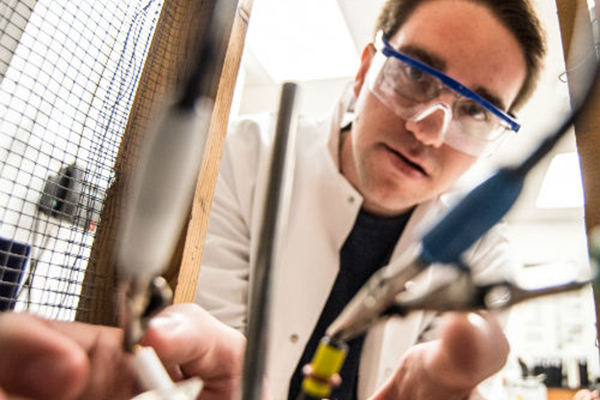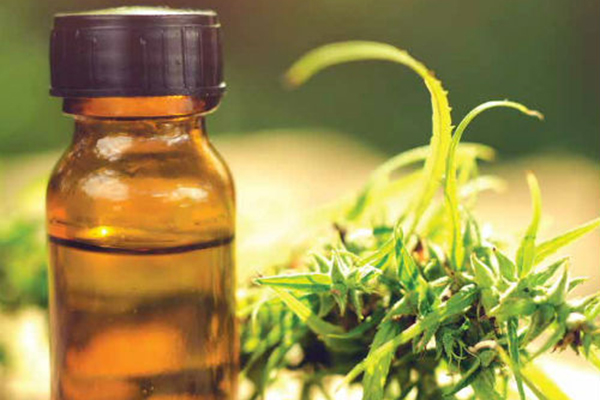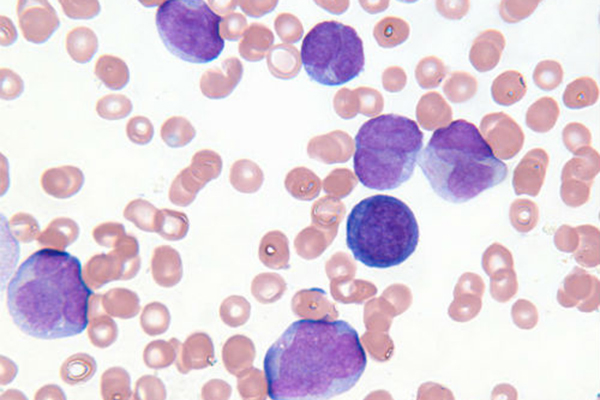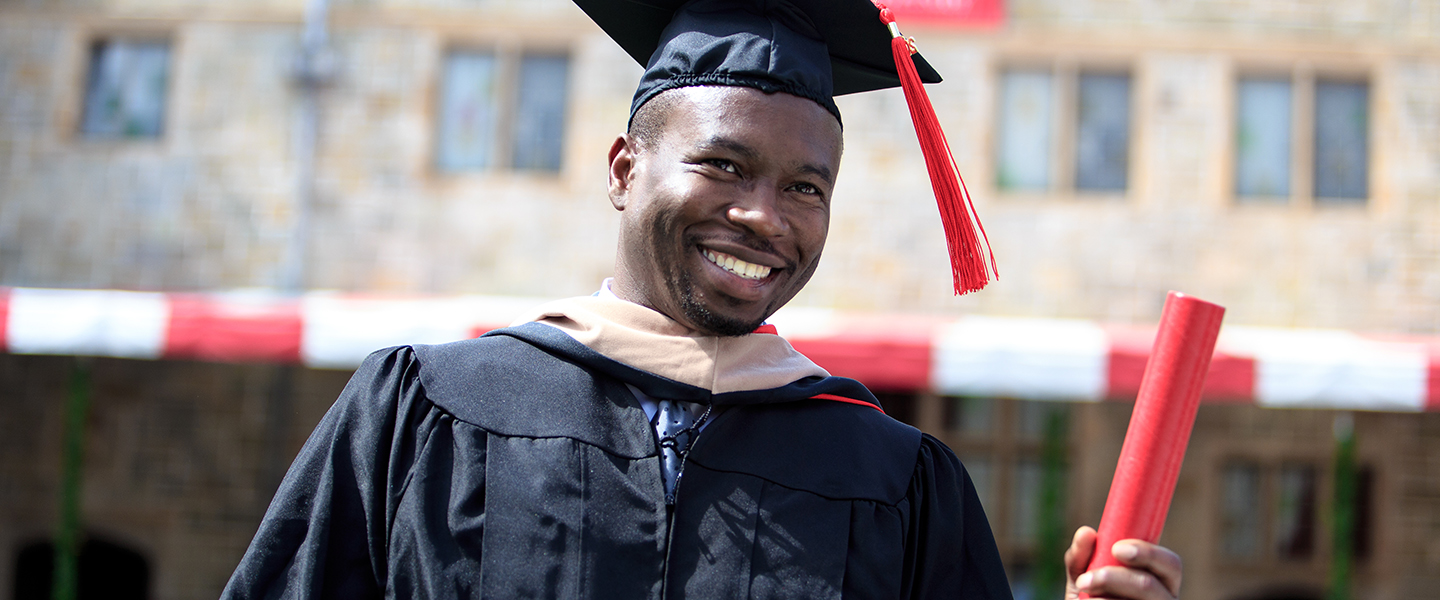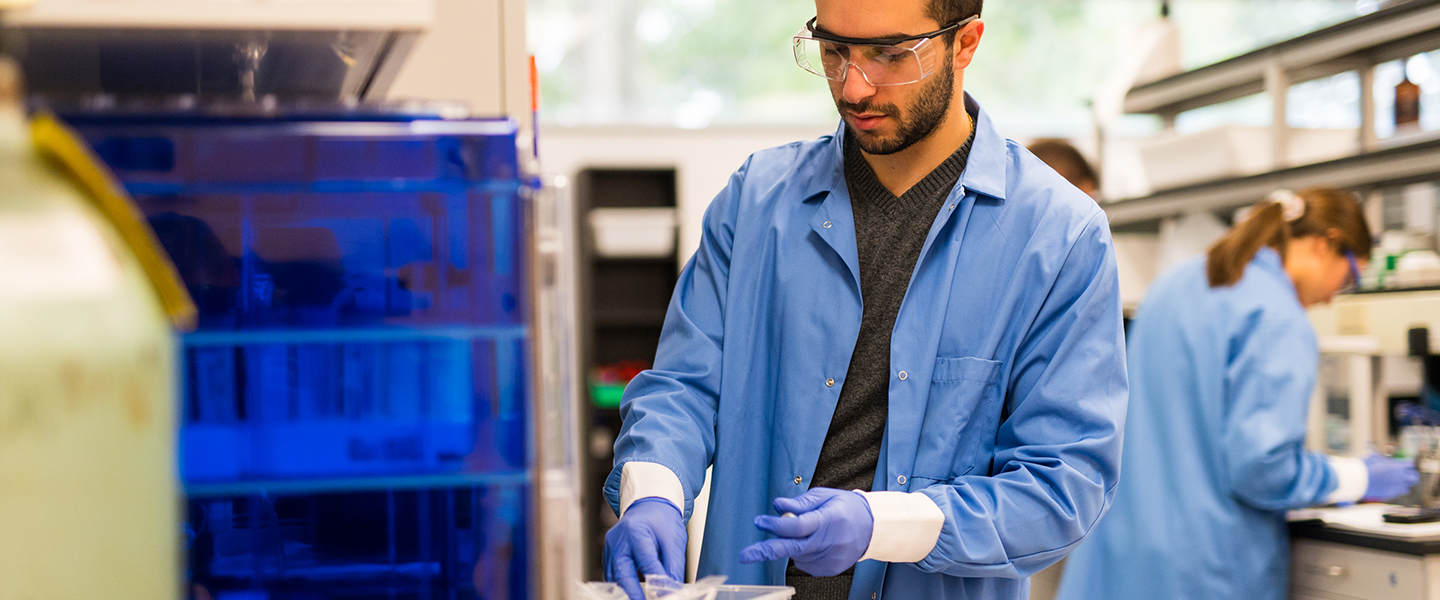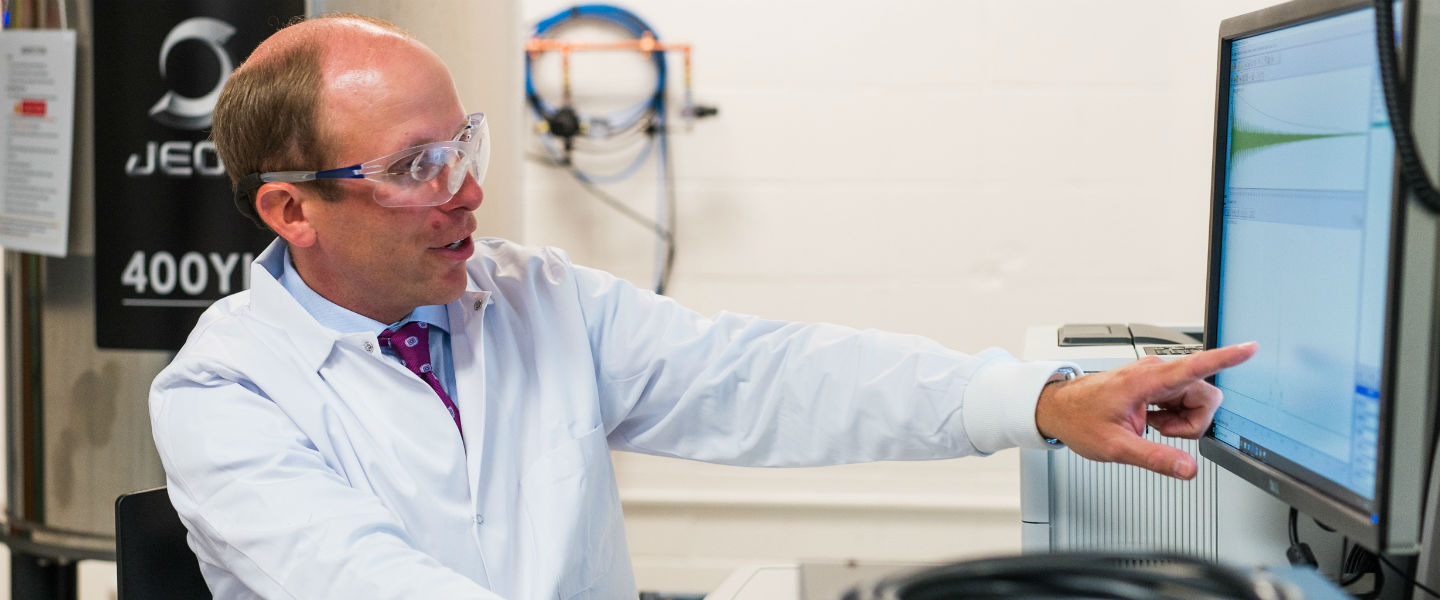On This Page
Program Overview
Chemistry and biochemistry are broad disciplines that seek to understand our world from the viewpoint of atomic and molecular behavior. Chemists and biochemists integrate knowledge from biology, physics, and mathematics to solve problems in a wide variety of areas.
Fairfield’s chemistry curriculum emphasizes fundamental principles and applications that include faculty-led research and laboratory-based courses. Courses develop critical thinking, problem-solving skills, and experimental technique to provide ample preparation for future career success in a variety of fields, including medicine, dentistry, environmental science, forensic science, pharmacology, materials science, business, law, and more.
Fairfield chemistry majors study and work collaboratively in small classes with a knowledgeable, experienced faculty. Through independent study, they conduct original research and have the opportunity to intern in the academic, governmental, or industrial sectors.
The Department of Chemistry and Biochemistry and its curricula are certified by the Committee on Professional Training of the American Chemical Society (ACS). Certified programs are defined by high quality faculty, deep and broad curriculum, modern facilities, and modern instrumentation.
STEM at Fairfield University
Contact Us
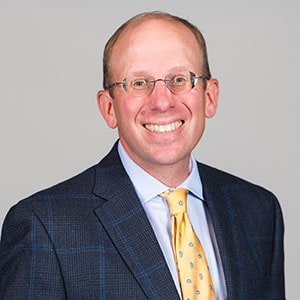
John R. Miecznikowski
Chair and Professor
Chemistry & Biochemistry
Office of Undergraduate Admission
P: (203) 254-4100
F: (203) 254-4199
admis@fairfield.edu
Requirements & Curriculum
The bachelor of science degree in chemistry or biochemistry, with or without ACS certification, can be achieved by following the appropriate course sequence outlined below. The first sequence describes the basic BS degree in chemistry. The second sequence is the preferred track for students seeking employment in the chemical industry or pursuing a PhD in chemistry and includes ACS certification. The third sequence is the BS in biochemistry. This sequence is recommended for students interested in the pharmaceutical industry, medical, or dental school and the pursuit of a PhD in biochemistry or related fields. This biochemistry sequence can also be ACS certified with the additional course work described. The ACS certified sequences feature more in-depth laboratory work and/or a greater emphasis on research.
Required Courses
| General Chemistry I and General Chemistry I Lab |
| General Chemistry II and General Chemistry II Lab |
| Organic Chemistry I and Organic Chemistry I Lab |
| Organic Chemistry II and Organic Chemistry II Lab |
| Chemical Analysis and Chemical Analysis Lab |
| Biochemistry Lab |
| Biochemistry I |
| Physical Chemistry I and Physical Chemistry I Lab |
| Physical Chemistry II and Physical Chemistry II Lab |
| Chemical Instrumentation |
| Instrumental-Analytical Chemistry Lab |
|
Advanced Inorganic Chemistry and *Advanced Inorganic Chemistry Lab (*Advanced Inorganic Chemistry Lab is only required for majors pursuing the ACS Certified Curriculum) |
|
*Research and Seminar I (*Research and Seminar I is only required for majors pursuing the ACS Certified Curriculum) |
| Calculus I for Chemistry, Engineering, and Physics Majors OR Calculus I |
| Calculus II for Chemistry, Engineering, and Physics Majors OR Calculus II |
| Calculus III for Chemistry, Engineering, and Physics Majors OR Multivariable Calculus |
|
*Ordinary Differential Equations (*Ordinary Differential Equations is only required for majors pursuing the ACS Certified Curriculum) |
| General Physics I and General Physics I Lab |
| General Physics II and General Physics II Lab |
Notes for the ACS Certified Curriculum
-
Students intending to enter primary or secondary school teaching should consult annually with the chairs of the departments of Chemistry and Education to facilitate scheduling of these curricula.
-
Students intending to enter medical or dental school should consult with the Chair of the Chemistry Department and the Health Professions Advisor for appropriate modifications of this curriculum, which will include taking BIOL 1171 and BIOL 1172 in their first year in place of PHYS 1171 and PHYS 1172, which are then taken in the sophomore year.
-
Students may elect to take CHEM 3324 Biochemistry I or CHEM 3341 Advanced Inorganic Chemistry in their junior year.
-
Note that the CHEM 4970-series Research and Seminar is a research elective to be coordinated with individual faculty members. It may be taken for one, two, or three credits. Students enroll in CHEM 4971 for their first semester of research, CHEM 4972 for their second semester, etc.
-
Students are encouraged to participate in summer research experiences on or off campus. At the discretion of the Chemistry Department, involvement in summer research such as National Science Foundation Research Experience for Undergraduate Programs may be counted toward the research requirement for American Chemical Society certification. Each case will be evaluated individually by the department.
-
All research for credit will be consistent with the American Chemical Society Committee for Professional Training guidelines.
| General Chemistry I and General Chemistry I Lab |
| General Chemistry II and General Chemistry II Lab |
| Organic Chemistry I and Organic Chemistry I Lab |
| Organic Chemistry II and Organic Chemistry II Lab |
| Chemical Analysis and Chemical Analysis Lab |
| One (1) Chemistry Elective |
| General Biology I and General Biology I Lab |
| General Biology II and General Biology II Lab |
| General Biology III and General Biology III Lab |
| General Chemistry I and General Chemistry I Lab |
| General Chemistry II and General Chemistry II Lab |
| Organic Chemistry I and Organic Chemistry I Lab |
| Organic Chemistry II and Organic Chemistry II Lab |
| Chemical Analysis and Chemical Analysis Lab |
| Biochemistry Lab |
| Biochemistry I |
| Biochemistry II |
| Physical Chemistry I and Physical Chemistry I Lab |
| Physical Chemistry II and Physical Chemistry II Lab |
| Calculus I for Chemistry, Engineering, and Physics Majors OR Calculus I |
| Calculus II for Chemistry, Engineering, and Physics Majors OR Calculus II |
| Statistics I OR Calculus III for Chemistry, Engineering, and Physics Majors OR Multivariable Calculus |
| General Physics I and General Physics I Lab |
| General Physics II and General Physics II Lab |
| One (1) Biology Elective |
|
One (1) *Chemistry Elective (*For a BS in Biochemistry certified by the ACS, both Chemistry electives, CHEM 3326 and CH 3341 with labs, must be taken.) |
| General Chemistry I and General Chemistry I Lab |
| General Chemistry II and General Chemistry II Lab |
| Organic Chemistry I and Organic Chemistry I Lab |
| Organic Chemistry II and Organic Chemistry II Lab |
| Biochemistry Lab |
| Biochemistry I OR Biochemistry II |
| One (1) Chemistry Elective |
Visit our our academic catalog for detailed course descriptions and more information.
Research Opportunities
The College of Arts and Sciences empowers and encourages undergraduate students from all disciplines to conduct innovative, in-depth, and collaborative research under the guidance and encouragement of faculty experts and staff. Each year, more than 300 faculty-student research projects are conducted in the areas of STEM, the humanities, arts, and social sciences, more than half of which are presented at national scholarly meetings and/or published in professional journals and manuscripts.
Check out some of our recent chemistry/biochemistry research projects below, then visit the College of Arts and Sciences undergraduate research page to learn more.
Electronic Properties in Peptides
Under the leadership of faculty mentors Amanda Harper-Leatherman, PhD, and Jillian Smith-Carpenter, PhD, biochemistry majors Samantha Brown '19 and Jonathan Myers '19 combined personal projects across labs to study how peptides with electronic properties can be used in biosensors.
Uric acid is a clinically relevant biomolecule, and its detection is important due to its links to diseases and medical concerns, which include gout and diabetes. For their research project, Brown and Myers studied the incorporation of synthesized self-assembling peptide structures in a layered electrochemical-sensing scheme for uric acid. The self-assembling peptides were synthesized to investigate the most effective short peptide sequence that could be used in a uric acid electrochemical sensor, and they found that the resulting structures and electronic properties associated with these modified peptide systems had great promise.
Analysis of CBD Products
Cannabidiol, also known as CBD, is a component found in cannabis that is widely used as treatment for pain and anxiety. Unlike the cannabis plant and other cannabis components, CBD is completely legal in the U.S. and has grown in popularity due to its wide variety of medicinal uses.
Under the mentorship of chemistry professor Matthew Kubasik, PhD, chemistry students Sally-Ann DeLucia '19 and Justin Gilbertson '19 pursued investigations into medicinal CBD products, including drops, capsules, and soft gels, to determine the actual amount of CBD compared to the reported amounts on the packaging. Using Gas Chromatography- Mass Spectrometry, they also setout to determine if any other components of cannabis could be found in the products.
Molecular Fingerprinting of Leukemia Cells
Mass spectrometry is a chemical technique that fragments molecules into small pieces so its original chemical structure can be identified. Matrix Assisted Laser Desorption/Ionization Time-Of-Flight (MALDI-TOF) is a specific type of mass spectrometry often used for characterizing biomolecules, and while routinely used to study bacteria, it is rarely used to analyze human cells.
In this research study supported by the Hardiman Scholars Fund, undergraduate students Catherine Andersen '19, Justin Gilbertson '19, Eunsun Hong '19, Tyler Lyons '19, and Justin Mercado '20, worked alongside faculty mentor Aaron VanDyke, PhD, to use a MALDI-TOF spectrometer to acquire a spectral “fingerprint” of K562 cells, a human chronic myelogenous leukemia cell line. Importantly, the number of cells, MALDI matrix, and spotting technique were useful for characterizing phenotypic shifts and differentiation patterns of K562 cells following experimental treatments.
Faculty-Mentored Student Research
Getting involved in faculty-mentored undergraduate research is a great way to supplement course work and gives students the chance to explore a topic at the cutting-edge of the chemistry or biochemistry discipline.
Benefits to conducting faculty-mentored undergraduate research include:
- Participating directly in the creation of new knowledge and scientific discovery
- Developing important problem-solving, communication, collaboration, and independent thinking skills
- Using the opportunity to reflect on your true academic and career interests
- Showing graduate and professional schools that you can take on a challenging project and explore an area in depth
- Earning a great recommendation letter to a graduate or professional program from a faculty mentor
- Talk to faculty members early in your career at Fairfield about their different research projects
- Attend CHEM 4971 student research talks
- Attend the annual Sigma Xi Poster Session
- Talk to students who have been involved in research
Semester Research Opportunities
Work for Academic Credit
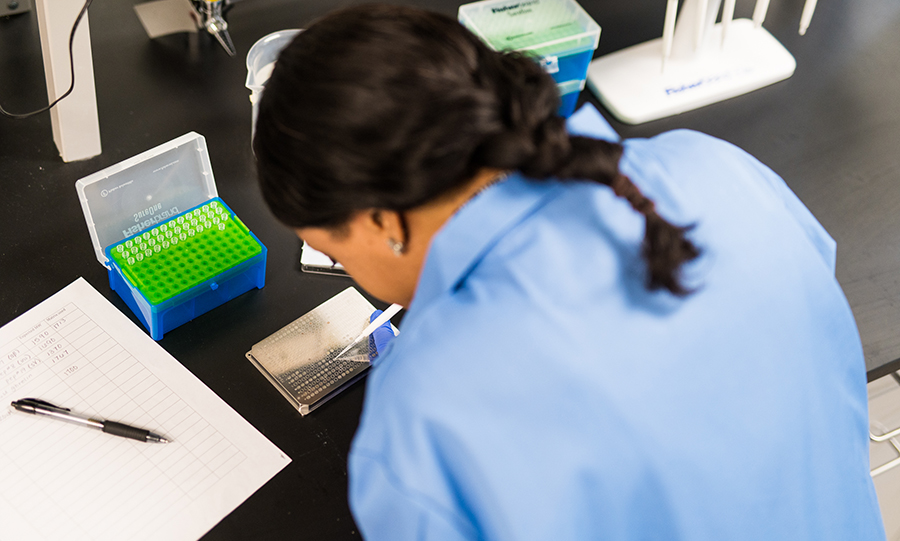
Work for academic credit by taking CHEM 4971: Research and Seminar
- Students sign up for this course after discussing a research opportunity and coming up with a specific project to work on with a specific professor
- Option to take one, two, or three credits (One credit is equal to three hours of lab work per week, two credits is six hours of lab work per week, and three credits is nine hours of lab work per week)
- Students in their senior year will typically take three credits of CHEM 4971 to fulfill the requirements for the American Chemical Society certified BS degree
- Younger students will usually take less credits and then potentially work up to taking more credits in future years
- When taking the full three credits of Research and Seminar, the student does the required research and also presents two oral seminars to the department during the semester
Work-Study Credit
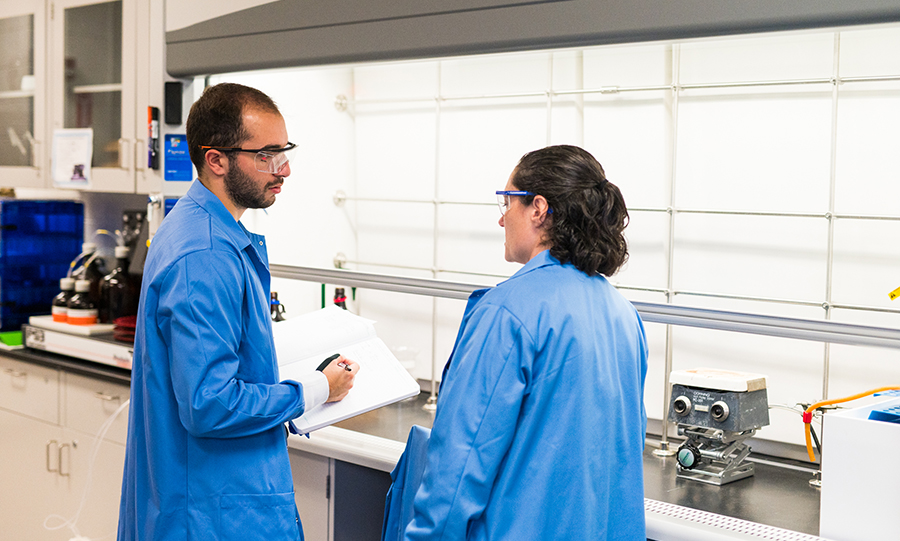
- Signing up for work-study credit involves the same process as signing up for CHEM 4971 in which a student would discuss a specific research opportunity and come up with a specific research project with a specific professor
- Hours worked would be dependent on work-study hours available for a particular student
Summer Research Opportunities
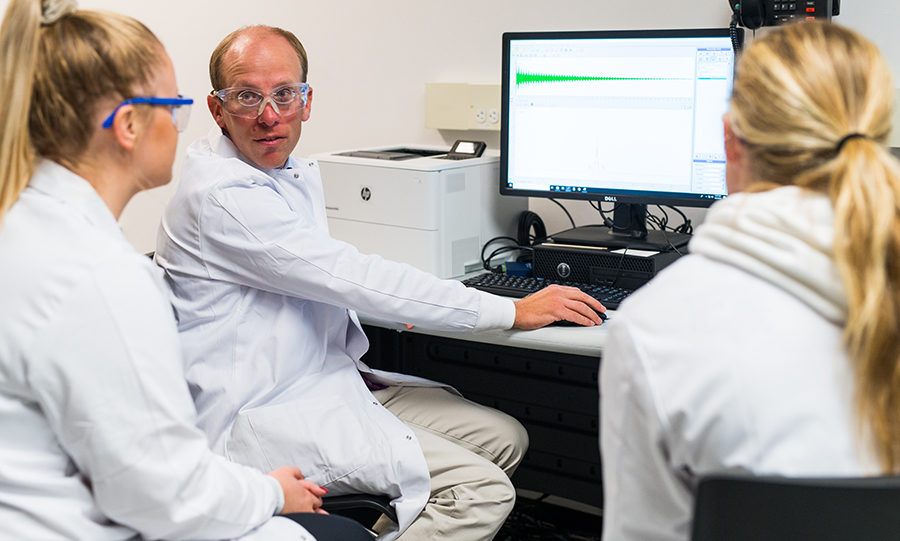
- Some opportunities exist for students to work full-time (35-40 hours per week) for a professor doing research for 8-10 weeks during the summer
- Typically, the student works for pay (based on availability of internal and external funds), although some volunteer opportunities or opportunities for academic credit also exist
- During typical summers, there are at least three chemistry/biochemistry professors working with one to two students each, and the researchers have met weekly for group meetings sponsored by the Sigma Xi Scientific Research Society Chapter at Fairfield to discuss research. These meetings are open to all science, math, and engineering students and faculty involved in summer research, making them great opportunities for interdisciplinary learning
More About Chemistry & Biochemistry
Life After Fairfield
With a broad educational background, our graduates move in many directions, but a degree in chemistry or biochemistry gives them an orientation. A number of Fairfield students enter medical, dental, or pharmacy school after graduation, while some choose advanced study in chemistry or biochemistry and others pursue full-time employment.
In the last few years, chemistry or biochemistry majors moving onto professional or graduate school have earned acceptances at such institutions as:
- Harvard University
- Boston College
- University of California at Berkeley
- University of Pennsylvania
- Villanova
- Tufts University
- University of Connecticut
Some careers that our recent graduates have gone on to pursue include:
- Health professions
- Law
- Secondary education
- Environmental science
- Forensic science
- Industry positions in research and development
- Sales and marketing
- College academic professions
Learn how Fairfield's Career Services can support your post-graduate goals, and how our tight-knit alumni network can build career and mentoring opportunities that last a lifetime.
Diversity and Inclusive Excellence
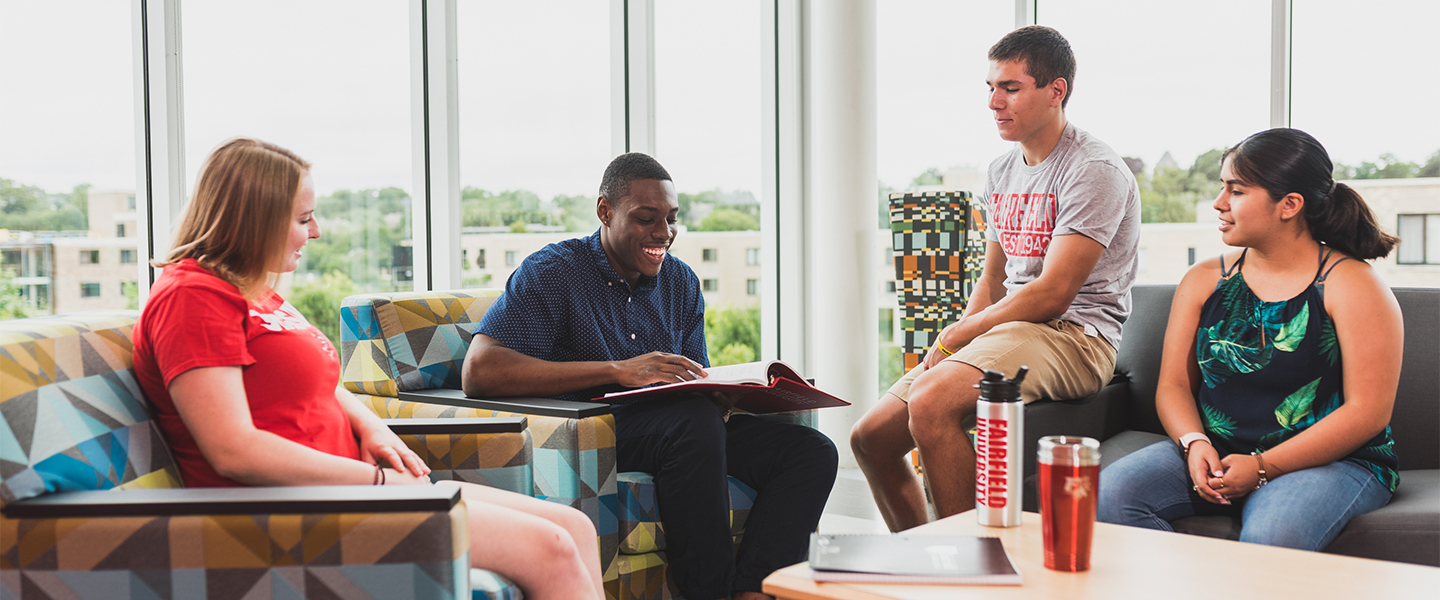
As a Jesuit, Catholic university, Fairfield is dedicated to diversity and inclusion; to radical hospitality in service of racial, social, and economic justice.
Instrumentation, Equipment, and Resources
Fairfield University Chemistry & Biochemistry Department
Major Equipment & Resources
Spectroscopy:
- 400 MHz JEOL ECZS NMR Spectrometer with a ROYAL HFX probe and pulsed field gradient and variable temperature capabilities.
- Cary 60 and 100 UV-Visible Spectrometers (with multicell holder and variable temperature peltier controller)
- Bruker Alpha FT-IR spectrometers (with ATR accessories)
- Bruker Tensor 27 FT-IR spectrometer
- PTI Xenon Flash Fluorescence fluorimeter
- Rudolph Research Autopol 1 Polarimeter
- Perkin Elmer Atomic Absorption Spectrometer
- Biotek H1 Monochrometer-based plate reader
Mass Spectrometry:
- Shimadzu Axima Confidence MALDI-TOF with SARAMIS iD Plus (positive and negative ionization with both linear and reflective modes)
- Shimadzu GC/MS (with autosampler, EI/CI ionization modes, and direct MS injection capability)
Synthesis:
- CEM Microwave Synthesizer
- MBraun Inert Atmosphere Glove Box
- MBraun Solvent Purification System (used to purify acetonitrile, dichloromethane, diethyl ether, dimethylformamide, and tetrahydrofuran)
Chromatography:
- Agilent and Gow-Mac Gas Chromatographs
- Shimadzu HPLC with UV-detector. This instrument contains an autosampler and a fraction collector.
- Varian HPLC with UV-detector
- Buchi C800 Automated Flash Chromatography System
Computational Chemistry:
- Gaussian09 Rev E.01 (Gaussian, Inc) installed locally on two 12-processor UNIX systems. Access for students and faculty is via Gaussview browser based WebMO, or by direct login.
Electrochemistry:
- Pine WaveNow and Cypress Systems potentiostats
Library:
The DiMenna-Nyselius Library is adjacent to the Bannow Science Center. The library has online subscriptions to major chemistry journals (ACS and RSC) with holdings substantively beyond ACS guidelines. The University also has access to SciFinder Scholar. Interlibrary loan provides resources not available on campus.
Cell Culture Work:
- New Brunswick E24R Refrigerated Incubating Shaker
- CO2 regulated cell culture incubator
- Laminar Flow Hood
- Confocal Microscope
- Syngene Imaging Station (fluorescent and chemiluminescent capabilities)
- Fisher Scientific 45 cu ft. chromatography refrigerator
Other Resources:
Faculty members collaborate with undergraduates in dedicated 320 ft2 (minimum) research laboratories equipped with four, six or eight-foot fume hoods. Vacuum pumps, rotary evaporators, nitrogen gas, chiller baths, Schlenk lines, and glassware are available in the department for faculty research needs. We have a full-time laboratory manager and a full-time program assistant who place and track orders for research among other duties. A machine shop is located in Bannow Science Center and is available to support research needs.
A quadrupole LC-MS and a high-resolution mass spectrometer are available at Yale University West Campus (25-30 minutes away by car) and in the Chemistry Department at Yale University (45-50 minutes away by car) and have been used by Fairfield faculty. The possibility exists to arrange the use of other instruments at Yale University as well.
Faculty
The College of Arts and Sciences at Fairfield University is home to a vibrant community of engaged faculty, dedicated staff, and accomplished scholars devoted to the process of invention and discovery and excited by the prospect of producing knowledge in the service of others. Meet the dedicated members of our Chemistry and Biochemistry Department.
